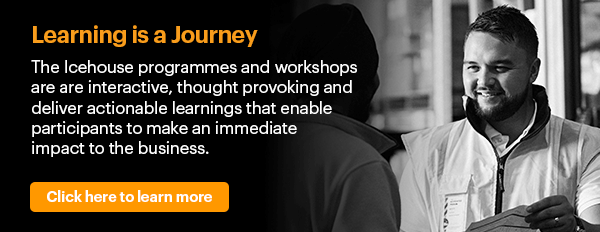
How are we doing New Zealand?
How are we progressing in New Zealand, what is the state of our business pipeline, are we now the lucky country, what is missing, gone and maybe returning?
There are four legs to this stool when we consider answers to these issues. Firstly, context let me share about the Icehouse, our history, results and ambitions. Secondly, my five-cent view on the state of New Zealand and maybe a burning platform that is hidden to you. Next comes hope, because we all need to have hope in our lives, and finally how you can get involved to contribute, assist and benefit.
Context – The Icehouse
The Icehouse was founded in 2001 by the University of Auckland Business School and a group of corporate Kiwi and international organisations including BNZ, Spark, Boston Consulting Group, Microsoft & HP - it was around the time of the knowledge wave conferences.
The Icehouse’s focus is the entrepreneurial economy and to find a way to have a material impact on the performance of the wider Kiwi economy. We deliver on this by focusing on lifting the aspirations and capabilities of entrepreneurs and business owners. Into the how - we create programmes and engagements that are tailored by the stage of the entrepreneur and/or business. For example, for the bright spark student at the University of Auckland, we partner with the Business School & UniServices to deliver inspirational addresses, workshops & challenges that inspire some of these students to start a business with their ideas. For startup entrepreneurs we offer seed investment, assistance with market validation and initial acceleration; followed by access to angel funding and finally internships to offshore markets. For owner-managers of established entrepreneurial businesses, we offer retreat-based programmes and one-on-one coaching on the implementation of their business plans for them and their staff.
By the end of 2014, we built up 5,000 alumni. These alumni are growing their revenue 2.5 times faster than the average Kiwi business; they are tripling their profits every 4 years; headcount is growing 6% year on year and we are consistently raising seed & angel investment of $10m per year. The first 13 years of The Icehouse enabled 12,500 new jobs in the Kiwi economy. It’s clearly working, and as Malcolm Gladwell has stated, we have now done our 10,000 hours, it is time to scale. The Icehouse's ambition for 2020 is to create 25,000 new jobs in the Kiwi economy and see broadly a 10% lift in the country’s GDP.
New Zealand’s Burning Platform
Secondly, my five cents on New Zealand, a hidden metric and a possible solution to address. But first, are you an optimist or a pessimist? Do you believe in a definitive or indefinite world? What happens when we combine these two elements as Peter Thiel recently did in his book Zero to One? How does this change when you put your country hat on vis-à-vis your personal hat? This reflection is helpful when you consider my thoughts on what is challenging New Zealand now, given the relatively hidden nature that it is.
My five cents on New Zealand is the current Government has a definitive optimistic plan for our economy and possibly an indefinite optimistic approach to the challenge that exists, and that is dangerous.
NZ has experienced a great few years. We have ridden the commodity boom and other misfortunes. Things have changed for the better, while many things have not. We have always it seems, produced great people and some teams which are world-beaters, but we have not and are not creating great companies on a global scale fast enough.
The key & hidden metric – how many companies in NZ employ > 100 employees?
The answer is 2318, with an average employee number of 430, representing 48% of all employed persons in our country. Is this a big number? A small number?
Actually, the relative result is very similar to comparative countries. The big and scary difference is the quantum size of our big companies vis-à-vis these other countries. Our big, are way, way smaller. This has implications that are not encouraging for our long-term prospects and I believe this needs to change for us to improve the nature of our economy and ultimately GDP per capita for our people – without this wealth, we will not be able to look after our people and the increased stratification that is occurring between the rich and poor all over the world will also be in NZ – that leads to discontent and more.
We know we produce good talent, whether that is as sports persons or executives in large organisations. We know we can make stuff, like milk and even more recently in technology. But can we build big companies that ultimately benefit and help us create a better future for New Zealand? Big question. Our Government knows this is the problem. Even though it may be harsh to say its position is as an indefinite optimist, I contend that it lacks a plan and confidence to attack this issue, and maybe it has not prioritised this up the stack as far as it should. One company the size of Fonterra is not going to cut it, it is like we call ‘key person risk’, and we know what happened in China last year with Fonterra, let alone the current challenges.
My solution, only one thing matters and that is talent, but talent specifically in building bigger and bigger companies. Let’s take the pulse for far...
We have
- a great bunch of ex-pats and Kiwi-philes, arguably an over-supply for the demand of their skills, experience & networks
- emerging technology and new-age leaders
- aspirational millennials who don’t want to work for the ‘man’
- an emerging group of early-stage investors – angels and VCs particularly who are learning fast how to support and enable our companies to succeed
- an emerging global group of believers – Peter Thiel of Founders Fund, Sam Altman of Y-Combinator and Vinod Khosla of Khosla Ventures to name just three.
We don’t have
- senior executives in our big companies who are built to succeed in the world
- board members of our big companies with diverse perspectives and experience from key markets such as Asia and America
- a supply of entrepreneurs who can turn ideas into global companies like the Israelis or Americans
- a supply of talented executives in fast-growing industries like technology that can do the coding do the tech work
- a set of investment bankers who can help build global capital pools to support our company's global aspirations
There is ‘work to do’ – and the only thing to do when faced with a big challenge is start biting it off one chunk at a time.
We must do something, we must engage, nominate yourself to go on the boards of Kiwi companies to give them an outside-in perspective. Do like Bridget Coates, Derek Handley, Phil Veal and Claudia Batten – find a way onto the Boards – yes I know it is an ‘old-blue-rinse-club’ the Director pool in NZ, both men and women and it was very challenging for these people to break through, but they did, and so should you, because it does and will make a difference.
If you are from the tech industry, and you know how to hire and train more people to get into the tech industry, we need you in NZ, because our fast-growing tech companies are sucking up all available talent and not investing enough to fill the gap of what is likely 10,000 jobs right now. Actually, our big companies that are growing fast are not investing enough in the future pipeline of talent.
If you have influence with the government, get them to open up the board participation on government boards particularly from offshore and get the investor migrant rules changed which are seeing over 85% of $3.5 – 4 billion of new money coming into NZ sitting in Government bonds rather than being directed to support the growth ambitions of our next generation of Kiwi success stories.
So don’t relax and think, she’ll be right, because it won’t, we must do much more – key message, get involved, it will make a difference.
Hope
So despite the challenge, despite the hurdles, the signs are also good. There is a shift happening in NZ, it is just that you need to look for it.
Look at the number of listings over the last few years alongside the performance of the NZX itself, which has ranged from 15-28% year on year for the last three. Xero, eRoad, Wynyard Group and Orion Health – in the case of Orion Health, it is rumoured on paper, that its venture capital investor, Pioneer’s returns from Orion amount to its full first fund – that is what we call a unicorn that only took 20 years. That never happens in New Zealand! There have been exits too – Greenbutton’s sale to Microsoft generated a significant return for the founders and investors. Sutton Group and Gardians was sold to Danone showing it is just not tech where value can be created. There is also an emerging pack, look at some of these companies – Lanaztech, Rocket Lab, PowerbyProxi, Adherium, Vend and Shuttle Rock. And some upstarts regularly coming out – STQRY, Puteko, Parrot Analytics, Drikolor, 1-Above, Harmoney, Crop-X, Texus Fibre and iMeasureu.
All of this activity is healthy – it fuels and stokes the pipe, but we need to remember that we must see scale being achieved from this. How many companies sit alongside Fonterra and are actually delivering year-on-year sustainable returns? Wouldn’t it be great to have the top 10, top 50 globally relevant and scaled businesses owned out of New Zealand?
Giving and Getting
So to my last point, how can you help and how can you benefit, because this is not about charity, it is about opportunity. If you are a pessimist, that is ok, the world needs balance. We do however love believers and optimists, because when the time is tough, it is great to have people who believe in trying just a bit harder, pushing harder to find the path. Get involved is my message, think about how you can contribute to helping our companies get bigger and better. Being a mentor can be hard, because often they are the first who have to deliver tough news - that is ok, because that is a critical role. There is a greater consciousness in New Zealand today, a greater desire to build, we are more aware and open. Yes, the plonkers remain present, who believe in a DIY she’ll be right mate, just get on a plane and it will be sweet, don’t worry about them, they will never go away!
From an Icehouse perspective, we have two key initiatives underway to address the scaling of Kiwi companies in addition to the work we already do.
Icehouse 2020 is an endowment funding campaign to raise $5m to get more Kiwi businesses on their growth journey, the funds will be utilized for a scholarship fund that will provide up to 25% contribution to people attending Icehouse programmes, a new set of offerings to scale firms and nationalizing our offering more widely across NZ. We would love support – we started informally raising in early January and to date have $350,000 into the scholarship fund, please get in touch with us if you wish to contribute.
The Partners Fund is a $5-10m fund we are raising as an active seed and angel fund to invest in the best startups coming across our deal flow platforms. Our thesis is that there remains a great opportunity for the founders of tech startups and investors if you can create funding partnerships early enough in their journey that also link into foreign markets and investors – accelerating them more quickly and with more expertise. There is a global war for talent as shown more recently by groups such as Y-Combinator, Tech Stars and 500 Startups – they are coupling deal flow platforms with funding and we will do the same, in an NZ context.



